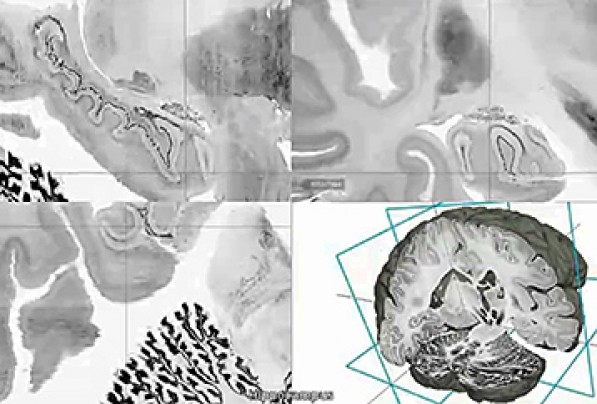當(dāng)前位置: Language Tips> 雙語新聞
Scientists create high-resolution 3-D atlas of human brain
分享到

|
The digital three-dimensional model called "BigBrain" was produced from the thousands of sections made from the brain of a 65-year-old woman. Its resolution is finer than a human hair, so it can reveal clusters of brain. A 65-year-old woman’s brain was cut into 7,400 slices to create the most detailed three-dimensional atlas of the human brain ever made, bringing researchers one step closer to reverse-engineering the brain’s convoluted circuitry. Brain atlases are essential reference tools for researchers and physicians, to determine which areas are “l(fā)ighting up” during a task or thought process, or during image-guided surgery. The better the atlas resolution, the better doctors can target ever-smaller parts of the brain and their individual function. The atlas creators, who are from Canada and Germany, have made the ultrahigh-resolution model — 50 times more detailed than a typical scan — publicly available in a free online format. The authors also published their work in the journal Science on Thursday. The atlas, called BigBrain, offers a common basis for open, worldwide scientific discussion on the brain, said author Karl Zilles of the Heinrich Heine University Düsseldorf. Zilles pointed to a novel treatment for Parkinson’s disease called deep brain stimulation, where electrical impulses are sent through electrodes implanted into specific points in the brain. He said BigBrain may open the doors for more accurate localization of electrode placement and thus render treatment more effective. After staining and digitizing the thousands of plastic-wrap-like slices, the nearly cellular resolution map revealed the network of layers, fibers and microcircuits of the woman’s brain. While variation exists among brains, across ages and individuals, they have largely the same distribution of brain structures and anatomy, said author Alan Evans of McGill University’s Montreal Neurological Institute. There are “subtle shape changes among individuals,” but all atlases start from one representative brain and go from there. The team was chiefly limited by computing power and capacity. To map the human brain with 1 micron spatial resolution, which has been done for mouse brains, the atlas would take up 21,000 terabytes of data — essentially rendering it impossible to navigate. By comparison, BigBrain, with its 20 micron resolution, comprises about a terabyte of data. Prior MRI-based atlases had resolution of 1 millimeter. Richard Leigh, a Johns Hopkins neurologist, said he’s looking forward to test-driving BigBrain for his research on stroke recovery. With the microscopic detail available, Leigh can see which particular groups of neurons are growing through stroke treatment rather than just a general fuzzy area. Evans was in Seattle on Wednesday working with the Allen Institute for Brain Science. Created by Microsoft co-founder Paul Allen, who has committed $500 million since its start in 2003, the Allen Institute has assembled a less-detailed human brain atlas of its own. BigBrain is part of the European Union’s Human Brain Project that brings together specialists in neuroscience, medicine and computing to decipher the mysteries of the brain. President Obama announced in April an initiative to map the human brain, describing it as a way to discover cures for neurological disease and strengthen the economy. |
據(jù)《華盛頓郵報(bào)》6月21日報(bào)道,科學(xué)家成功繪制出有史以來分辨率最高的3D人腦圖譜。這意味著,研究人員在大腦回路逆向工程方面的研究更進(jìn)了一步。 大腦圖譜是科研人員和醫(yī)生必備的參考工具,通過圖譜,他們可判定在工作、思維過程中,或是在圖像導(dǎo)航的外科手術(shù)過程中,大腦哪個(gè)區(qū)域在變化。圖像分辨率越高,醫(yī)生就能更好地聚焦大腦微小的部位,研究它們各自的功能。 加拿大和德國的研究人員制作了這份大腦圖譜,并于6月19日在《科學(xué)》雜志上發(fā)表。他們將一名已故的65歲女性的大腦切成7400片,將切片染色并進(jìn)行數(shù)字化處理,最終生成高清模型,清晰地呈現(xiàn)出這名女性大腦的皮層、纖維和微電路結(jié)構(gòu)。大腦圖譜分辨率比普通掃描的精度高出50倍,并在網(wǎng)上對公眾免費(fèi)開放。德國杜塞爾多夫海因里希·海涅大學(xué)的卡爾·齊勒斯稱,該圖譜名叫“大腦”(BigBrain),它為在世界范圍內(nèi)公開對大腦進(jìn)行科學(xué)討論提供了基礎(chǔ)。 齊勒斯指出,帕金森綜合癥有一種新治療方法叫“深部腦刺激”,該方法通過植入大腦特定部位的電極輸出電脈沖。他說,“BigBrain”能使電極植入的部位更精確,使治療更有效。 麥吉爾大學(xué)蒙特利爾神經(jīng)學(xué)研究所的艾倫·埃文斯稱,由于年齡和個(gè)體不同,大腦也會有所不同,但人腦的結(jié)構(gòu)有很大的共性。大腦“因個(gè)體不同會有微妙的形態(tài)變化”,但萬變不離其宗。 這個(gè)研究團(tuán)隊(duì)受到計(jì)算機(jī)能力和容量的局限。研究人員曾繪制分辨率為1微米的老鼠大腦圖譜,但如果要繪制同樣精確的人腦圖譜,將占用2.1億億字節(jié)的數(shù)據(jù)空間,基本不可能用來作圖像導(dǎo)航。相比之下,“BigBrain”的分辨率是20微米,約占1萬億字節(jié)的空間。而此前磁共振成像(MRI)繪制的大腦圖像精度是1毫米。 約翰·霍普金斯大學(xué)神經(jīng)學(xué)家理查德·利表示,他期待將“BigBrain”用于他的中風(fēng)康復(fù)研究。有了更清晰的大腦微觀圖像,利就可以觀察到,在中風(fēng)治療期間,哪些特定的神經(jīng)元簇有所生長,這比看起來模糊一片要好得多。 埃文斯6月19日在美國西雅圖和艾倫腦科學(xué)研究所一起工作。2003年,微軟公司的創(chuàng)始人之一保羅·艾倫出資5億美元,聯(lián)合建立了艾倫腦科學(xué)研究所。目前,該研究所已繪制了自己的人腦圖譜,但是分辨率稍低。 BigBrain是歐盟“人腦工程”的一部分,該工程集中了一批神經(jīng)學(xué)、醫(yī)學(xué)和計(jì)算機(jī)領(lǐng)域的專家,欲破解大腦之謎。今年4月份,美國總統(tǒng)奧巴馬曾宣布了一項(xiàng)大腦圖譜工程,他認(rèn)為,該計(jì)劃可以找到治愈神經(jīng)疾病的方法,還可以振興美國經(jīng)濟(jì)。 相關(guān)閱讀 (翻譯:聞竹 編輯:Julie) |
上一篇 : 英國罕見“食羊植物”開花
下一篇 : 美國“機(jī)遇”號發(fā)現(xiàn)火星上存在生命起源之水
分享到
關(guān)注和訂閱

關(guān)于我們 | 聯(lián)系方式 | 招聘信息
電話:8610-84883645
傳真:8610-84883500
Email: languagetips@chinadaily.com.cn